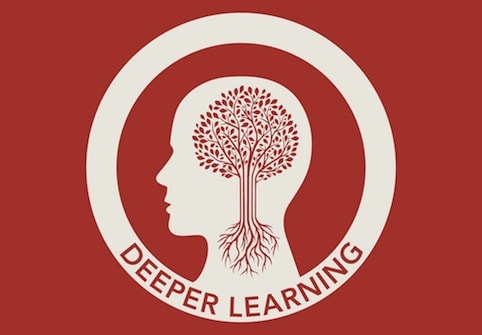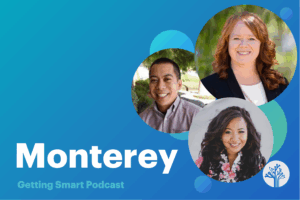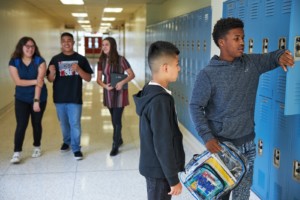Deeper Learning–Not Just for Honor Students

Students in the same big American secondary schools often have very different experiences: students that start a few grade levels behind get a thin drill-based pedagogy while high performing students receive enriched coursework from talented teachers; struggling students often get a double dose of test prep while advanced students take thought provoking electives and challenging college level courses.
Powerful learning experiences. The alternative to thin test-prep is an engaging sequence of learning experiences–for all students. Anson New Tech is a good example. “The school has helped an extremely poor rural community of 25,000 to graduate students that have the skills they need to be successful in life,” according to principal Chris Stinson. Like other schools in the New Tech Network, Anson engages students in big projects and expects quality work product.
Students at the International School of the Americas in San Antonio engage in big projects each year. Only two months into their freshmen year students write and perform a play in an elementary classroom. Sophomores study acculturation versus assimilation of indigenous groups. Juniors take on a modern injustice. Seniors wrestle with UN Millennium Development Goals.
Mindset. Kearny High School of Digital Media & Design Principal Cheryl Hibbeln said, “a student-centered approach to teaching, teacher collaboration through common prep planning periods, and a focus on engagement through real world project-based learning [have been] major factors in the overall rise in student achievement.”
One of four academies on a big San Diego campus, the development of an academic mindset can be a significant challenge for Kearny’s students, many of whom come into high school at well below normal expectations for their grade level. Hibbeln and her staff tackle this issue through “an intentional multi-grade approach, and common instructional expectations.” She said her teachers “share a common belief that all students are capable of meeting state academic performance standards, and they hold students accountable to those standards.”
DMD uses an emphasis on “Habits of Mind”–significance, perspective, evidence, connection, supposition–developed by small-school reform leader Debbie Meier, combined with skill building and high expectations to help students develop an academic mindset.
The mission at Kearney DMD is to “develop exemplary communication skills in students through authentic, media-based experiences in an environment of high academic and social expectations.” In that pursuit, DMD emphasizes project-based learning, which encourages the transfer and application of knowledge obtained in the classroom to the interdisciplinary projects students must complete each year. These projects integrate elements from each of their core courses and “require students to make connections between multiple subjects and a real world problem,” said Principal Hibbeln.
Engagement. Teachers at Chula Vista High Tech High work in cross-content area teams such as math and science to develop projects that focus on collaboration as well as mastering the skills necessary for each subject. In all classrooms, inquiry-based study engages student interest and encourages the development of essential skills such as cooperation, collaboration, and effective communication.
According to humanities teacher Andrea Morton, many projects involve “observing, questioning, predicting, researching, designing, experimenting, and concluding, and teacher strategies include research projects/papers, Socratic seminars, mock trials, debates, model creation, modifying existing designs, designing/conducting experiments, predicting outcomes, analyzing data and forming conclusions.”
The four academies at Reynoldsburg High (east of Columbus) are developing capstone experiences designed to bridge high school coursework with college and job preparation. At eSTEM, students can sign up for one of three Capstones focused on design; logistics; or energy, environment, and the economy. Each triple-block-course packs in college credit courses (MOOC or AP), internship, and undergraduate-style research projects. The combination of small academies and big blocks makes it easier to incorporate new delivery technologies and customized learning experiences.
Support. With many Chula Vista students arriving with below-grade-level academic skills and most dealing with the extra-curricular stresses of poverty, teachers constantly monitor student performance and quickly modify instructional strategies. Morton said, “If a student doesn’t understand a concept, teachers will offer one-on-one tutoring to ensure they do; a tutoring center is also available after-school. Because we are dedicated to providing a personalized environment for our students, we are constantly finding new ways to change/individualize how we teach. We aim to scaffold our projects and provide multiple entry points for all students, leading toward quality products and outcomes in which the content is fully understood.”
Reynoldsburg students all engage big relevant projects but receive individualized support. A student told the Columbus Education Commission they enjoyed individual pacing, more instructional resources, and mastery-based progress where there is always the opportunity, “if you don’t do well on a test you can go back and correct your work.”
International School of the Americas creates a high challenge, high support environment for prospective teachers as well as students. As a professional development school for undergraduate students, ISA challenges assumptions about high schools and student learning. Interns experience a globally-focused, interdisciplinary, project-based, authentic, and relationship-driven curriculum.
Secondary schools that promote deeper learning engage all students in powerful learning experiences; they develop academic mindsets scaffolded by strong supports.







Eric Sheninger (@NMHS_Principal)
Here is an example of how NMHS is promoting deeper learning for ALL students https://sites.google.com/site/opencoursewarestudies/